2016年秋九年级英语全册 Unit 6 When was it invented语法课件
九年级英语Unit6 When was it invented知识点及练习

Unit6 When was it invented ?一.短语归纳1.It's my pleasure.= My pleasure. 我的荣幸2.seem+to+动词原形好像做某事3.such a great invention 如此伟大的一项发明4.think of = think about 想到,考虑5.in our daily lives 在我们的日常生活中6.in my daily life在我的日常生活中7.have a point 有道理8.by accident 偶然地,意外地9.over an open fire 在篝火上10.it mentioned that 它提到11.It is said that 据说12.It is believed that人们相信13.fall into(过去式fell into)=drop into掉进… 14.in the 19th century 在19世纪15.spread to other countries 传播到其他国家16.at a low price 以很低的价格17.bring(brought) sth. to sp.把某物带到某处18.all of a sudden 突然地19.less than少于,不到more than = over 超过20.without doubt 毫无疑问21.at that time 在那时22.advise sb (not) to do sth建议某人(不要)做某事23.start doing sth 开始做某事24.work on sth 致力于某事25.(be) similar to 与……相似26.the Olympics 奥运会27.by mistake 错误地,无意地28.make a mistake 犯错29.divide ...into…把…分成… 30.in the end = at last = finally 最后31.at the same time 同时32.teach(taught) sb to do sth 教某人做某事e up with 想出34.encourage sb. to do sth.鼓励某人做某事35.the purpose of ……的目的36.stop sb from doing sth 阻止某人做某事37.look up to sb.钦佩某人38.look up the word 查找单词39.work together 一起工作40.I want to achieve my dream.我想实现梦41.My dream will come true.我的梦想会实现42.work hard 努力工作43.on a hard floor 在坚硬的地板上44.lead to导致leader 领导,引路人45.Don't mention it.不客气,不用谢46.translate...into....把…翻译成…47.be used for doing sth=be used to do sth 48.dream of doing sth 梦想做某事二.用法集萃1. be used to do 被用来做某事be used as 被用作…be used by sb. 被某人使用2.help sb do sth.=help sb. to do sth. 帮助某人做某事3.make a decision to do sth.=decide to do sth.决定做某事4.make sb. + adj. 使某人怎么样make sb do sth使某人做某事be made to do sth 被使唤去做某5..in this way这样,用这种方式三语法全解1.some time 一段时间sometimes 有时some times几次sometime 某个时候2.one of the world's favorite drinks世界最受欢迎的饮料之一.one of …之一,后面的名词用复数(一般要加S),动词用单数(一般要加S);favorite,最喜欢的,前面要用“谁的”.3.thousand千hundred百million百万,当它们前面有数字的时候,它们本身不能加S,当它们后面有of的时候它们要加S,但前面的数字和后面的of不能同时存在4.not…until直到…才,I don…t go to sleep until 11 every day.我每天直到11点才睡觉。
九年级英语全册Unit6Whenwasitinvented知识点总结(超全)(带答案)

九年级英语全册Unit6Whenwasitinvented知识点总结(超全)单选题1、The hat is not the right ________ for me. I’d like a smaller one.A.sizeB.styleC.colourD.material答案:A句意:这顶帽子大小不适合我。
我想要小一点的。
考查名词辨析。
size大小,尺寸;style款式;colour颜色;material材料。
根据“I’d like a smaller one”可知,是尺寸不合适,故选A。
2、—Where do you think ________?—I guess they took it in Suzhou.A.was the photo takenB.the photo was takenC.did the photo takeD.the photo took答案:B句意:——你认为照片是在哪里拍的?——我想他们是在苏州拍的。
考查宾语从句。
本题动词“think”后跟宾语从句,从句用陈述句语序,故排除A、C;从句主语“the photo”与谓语动词“take”之间是被动关系,因此用被动语态,故选B。
3、— Look, Cindy. The flowers in our classroom come out in one night.— That's fantastic! They are beautiful and colorful. They________ nice. A.smellsB.smellC.soundsD.sound答案:B句意:——听着,辛迪。
我们教室里的花一晚上就开花了。
——太棒了!它们美丽多彩。
它们闻起来很香。
考查动词辨析和主谓一致。
本句主语They复数,可知谓语动词使用原形,可知排除A和D。
花应是闻起来很香,smell:闻起来;sound:听起来。
故选B。
九年级英语全册 Unit 6 When was it invented核心常考词汇详解素材 (新版)人教新目标版

Unit6核心常考词汇详解1.invent (v.)发明;创造invent指发明创造出自然界本来不存在的东西,如工具、方法、手段、汽车、电器、合成材料等。
【备课例句】Bell invented the telephone. 贝尔发明了电话。
Smith invented a new teaching method. 史密斯发明了一种新的教学方法。
【横向辐射】discover, find, create1.discover是“发现”的意思,是指发现原来就有而一直没被发现,如发现电、煤、石油等矿藏及新星、星系或科学真理等。
Columbus discovered America in 1492.1492年哥伦布发现了新大陆。
Recently they have discovered a comet. 最近他们发现了一颗彗星。
2.find的意思是“寻找”,强调找的结果,并不指发现。
I've tried to find another copy but couldn't find one. 我试图再找一本,但没能弄到。
3.create指有目的地把原材料制成新产品,也指创造出原来不存在的或与众不同的事物。
Man creates himself. 人类创造了自己。
A novelist creates characters and a plot. 小说家塑造人物并设计情节。
【课堂变式】根据语境提示,用invent, discover,find或create的形式填空,完成句子。
1.When _____ the stream engine(蒸汽机) ___?2. I can’t ____ my bike, I’m looking for it.3. Scientists are now trying to ___ if this is possible.4. Do you know who______ the plane?5. He ____quite a number of wonderful characters in his play.【解析】I.1.was, invented 2.find 3.discover 4.invented 5. created2. be used for 用来做……此短语中的for是介词,表示用途,后接名词或动词-ing形式。
九年级英语全册 Unit 6 When was it invented?知识点总结 (新版)人教新目标版
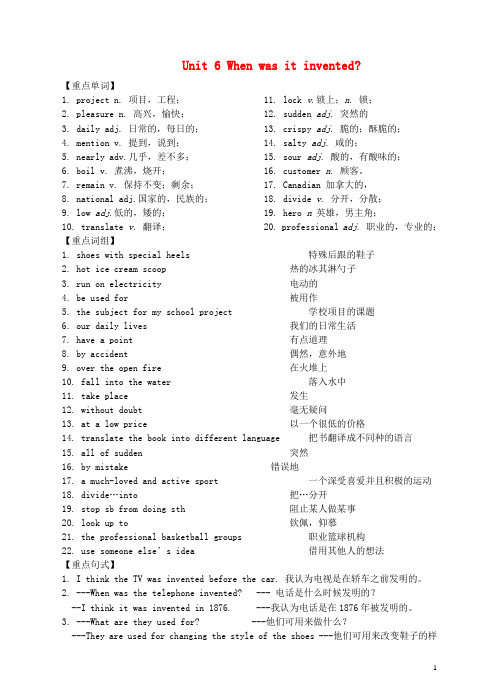
Unit 6 When was it invented? 【重点单词】1. project n. 项目,工程;2. pleasure n. 高兴,愉快;3. daily adj. 日常的,每日的;4. mention v. 提到,说到;5. nearly adv.几乎,差不多;6. boil v. 煮沸,烧开;7. remain v. 保持不变;剩余;8. national adj.国家的,民族的;9. low adj.低的,矮的;10. translate v.翻译;11. lock v.锁上;n. 锁;12. sudden adj. 突然的13. crispy adj. 脆的;酥脆的;14. salty adj.咸的;15. sour adj.酸的,有酸味的;16. customer n.顾客。
17. Canadian 加拿大的,18. divide v.分开,分散;19. hero n英雄,男主角;20. professional adj. 职业的,专业的;【重点词组】1. shoes with special heels 特殊后跟的鞋子2. hot ice cream scoop 热的冰其淋勺子3. run on electricity 电动的4. be used for 被用作5. the subject for my school project 学校项目的课题6. our daily lives 我们的日常生活7. have a point 有点道理8. by accident 偶然,意外地9. over the open fire 在火堆上10. fall into the water 落入水中11. take place 发生12. without doubt 毫无疑问13. at a low price 以一个很低的价格14. translate the book into different language 把书翻译成不同种的语言15. all of sudden 突然16. by mistake 错误地17. a much-loved and active sport 一个深受喜爱并且积极的运动18. divide…into 把…分开19. stop sb from doing sth 阻止某人做某事20. look up to 钦佩,仰慕21. the professional basketball groups 职业篮球机构22. use someone else’s idea 借用其他人的想法【重点句式】1. I think the TV was invented before the car. 我认为电视是在轿车之前发明的。
人教版九年级英语Unit_6_When_was_it_invented_教案

Unit 6 When was it invented?一.教材分析本单元涉及内容是本书当中比较重要的一部分。
被动语态结构及运用是教学中一个难点和重点,也是学生比较不容易理解的部分,因为它是建立在各种时态之上的。
另外通过对我们熟悉经常使用的发明物的历史来开阔眼界,丰富学生的阅历,使学生养成勤于思考,善于总结的好习惯。
二、教学目标1)知识目标扩容新单词,提高阅读能力。
理解和良好运用被动语态。
2)技能目标能谈论重要发明的历史及用途,能针对各项发明的用处及特点,发表自己的看法,并说明理由。
3)情感目标使学生懂得人类的科学发明创造了丰富的物质文明。
培养学生的创造发明的能力和愿望三、教学重点掌握一般过去时的被动语态四、教学难点弄清主动语态与被动语态的差异,通过练习和运用加以巩固五、教法运用本单元主要采用任务型教学。
在本课的任务型语言教学中,我将依据课程的总体目标并结合教学内容,创造性地设计贴近学生生活实际的任务活动,吸引和组织他们积极参与,使学生通过观察、思考、讨论、交流和合作等方式,在一种自然、真实或模拟真实的情境中体会语言、掌握语言的应用。
六、教学手段1)多媒体辅助:使用自制的课件,使抽象的语言变得直观,为学生运用英语进行交际创设情景,实现师生互动,生生互动和人机互动的多向交流。
2)非测试性评价:重视形成性评价,充分发挥其积极作用,促进新的评价体系的形成。
因此,本课我将各种活动设计成小组活动并开展小组竞赛和填写课堂自我评价表等非测试性评价手段,帮助学生学会自主学习,学会与人合作,培养创新意识以及具备科学的价值观。
七、教学效果预测;1.能够掌握被动语态,并运用到一定的语言环境。
2.通过多媒体和任务的完成学生会突破难点,产生一定创造精神。
3.能完成教学目标,调动学生学习热情。
八、课时安排:6课时九、教学程序Period One Section A 1 (1a-2d)一、教学目标:1. 语言知识目标:1) 能掌握以下单词: heel, scoop, electricity, style, project, pleasure, zipper,daily, website, pioneer, list, mention能掌握以下句型:①—When was the telephone invented?—I think it was invented in 1876.②—What are they used for? —They are used for seeing at night.2) 能谈论物品被发明的时间、发明者,表达某发明的用途。
人教版九年级英语Unit-6-When-was-it-invented-教案

Unit 6 When was it invented?一.教材分析本单元涉及内容是本书当中比较重要的一部分。
被动语态结构及运用是教学中一个难点和重点,也是学生比较不容易理解的部分,因为它是建立在各种时态之上的。
另外通过对我们熟悉经常使用的发明物的历史来开阔眼界,丰富学生的阅历,使学生养成勤于思考,善于总结的好习惯。
二、教学目标1)知识目标扩容新单词,提高阅读能力。
理解和良好运用被动语态。
2)技能目标能谈论重要发明的历史及用途,能针对各项发明的用处及特点,发表自己的看法,并说明理由。
3)情感目标使学生懂得人类的科学发明创造了丰富的物质文明。
培养学生的创造发明的能力和愿望三、教学重点掌握一般过去时的被动语态四、教学难点弄清主动语态与被动语态的差异,通过练习和运用加以巩固五、教法运用本单元主要采用任务型教学。
在本课的任务型语言教学中,我将依据课程的总体目标并结合教学内容,创造性地设计贴近学生生活实际的任务活动,吸引和组织他们积极参与,使学生通过观察、思考、讨论、交流和合作等方式,在一种自然、真实或模拟真实的情境中体会语言、掌握语言的应用。
六、教学手段1)多媒体辅助:使用自制的课件,使抽象的语言变得直观,为学生运用英语进行交际创设情景,实现师生互动,生生互动和人机互动的多向交流。
2)非测试性评价:重视形成性评价,充分发挥其积极作用,促进新的评价体系的形成。
因此,本课我将各种活动设计成小组活动并开展小组竞赛和填写课堂自我评价表等非测试性评价手段,帮助学生学会自主学习,学会与人合作,培养创新意识以及具备科学的价值观。
七、教学效果预测;1.能够掌握被动语态,并运用到一定的语言环境。
2.通过多媒体和任务的完成学生会突破难点,产生一定创造精神。
3.能完成教学目标,调动学生学习热情。
八、课时安排:6课时九、教学程序Period One Section A 1 (1a-2d)一、教学目标:1. 语言知识目标:1) 能掌握以下单词: heel, scoop, electricity, style, project, pleasure, zipper,daily, website, pioneer, list, mention能掌握以下句型:①—When was the telephone invented?—I think it was invented in 1876.②—What are they used for? —They are used for seeing at night.2) 能谈论物品被发明的时间、发明者,表达某发明的用途。
九年级英语全册Unit6Whenwasitinvented知识讲解及练习素材
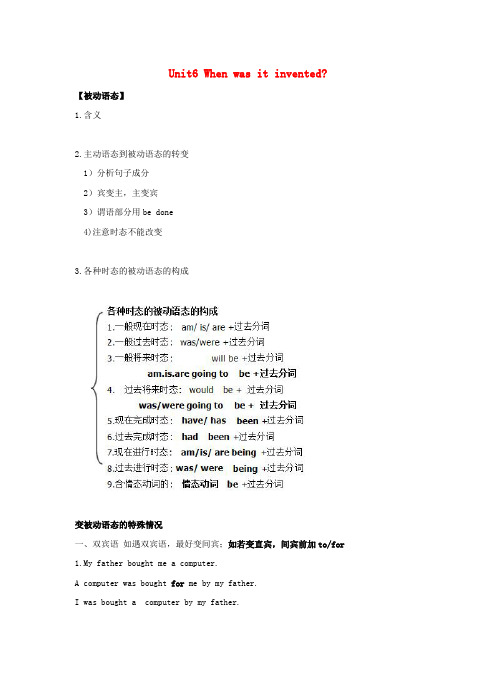
Unit6 When was it invented? 【被动语态】1.含义2.主动语态到被动语态的转变1)分析句子成分2)宾变主,主变宾3)谓语部分用be done4)注意时态不能改变3.各种时态的被动语态的构成变被动语态的特殊情况一、双宾语如遇双宾语,最好变间宾;如若变直宾,间宾前加to/for1.My father bought me a computer.A computer was bought for me by my father.I was bought a computer by my father.2.He gives me a book.A book is given to me by him.I am given a book by him二、无to不定式变为被动时加上to 感官动词真奇怪,被动语态to回来。
We often see him play basketball.He is often seen to play basketball by us.The boss made the children work for long.The children were made to work for long by the boss.三、注意动词短语的完整性take care of/look after/listen to/speak toThe old should be spoken to politely.The baby is taken good care of by the nurse四、不及物动词及系动词无被动语态happen /take place/ die/ rise /come true/ come out/run out被动语态练习一、将下列句子变为被动语态,每空一词。
1.We can finish the work in two days.The work _____ _____ _____ in two days.2.They produce silk in Suzhou.Silk ____ ______ in Suzhou.3.The children will sing an English song.An English song ____ ____ ___ by the children.4.I have given this book to the library.This book ___ ____ ____ to the library.5.Did they build a bridge here a year ago?____ a bridge ____ here by them a year ago?6.We'll put on an English play in our school.An English play ____ ____ _____ on in our school.7.More and more farmers buy color TV sets.Color TV sets ___ ___ ___ more and more farmers.8.We must water the flowers every day.The flowers must ___ ___ (by us) every day.9.They use knives for cutting things.Knives ___ ___ for cutting things.10.You can dig a hole in the earth.A Hole ____ ____ _____ in the earth.二、用动词的正确语态填空。
九年级英语全册Unit6When...

九年级英语全册Unit6When...九年级英语全册 Unit 6 When was it invented Section B(3a-3b)教案(新版)人教新目标版Section B,3a-3b一、Teaching Aims:1.to learn and to use new wordsCanadian divide divide ... into purposebasket the Olympics look up to hero2.to have a better understandingof the sport of basketball二、Teaching key points:1. sentences:A: I saw him playing basket on the playground.B: I saw him go into that room.He was seen to go into that room.2. new words and phrases:Canadian divide divide ... into purposebasket the Olympics look up to hero三、Teaching difficult points:Sentences;I saw him go into that room.He was seen to go into that room.四、Teaching Aids:1. a tape recorder2. the blackboard3. a computer with PowerPoint五、the second period (for one class)六、Teaching stepsStep1:Lead-inHow much do you know about these famous stars?Ask Ss to look at the pictures on PPT4-11and say something they know.Step2: New words and expressions1.Canadian adj. 加拿大的;加拿大人的n. 加拿大人 2. divide v. 分开;分散 3. divide ... into 把??分开4. purpose n. 目的;目标5. basket n. 篮;筐6. the Olympics 奥林匹克运动会7. look up to 钦佩;仰慕8. hero n. 英雄;男主角Step3: Do you like basketball? Do you watch basketball games? How much do you know about this sport? Discuss the sport with your partners and share your ideas with the class.Step4: Ask Ss to read the passage quickly. Find what is the main idea of eachparagraph?。
人教新目标九年级英语全册 Unit 6 When was it invented not only ...but also的用法

这个地区不仅受到了暴雨袭击,而且部分桥梁也被冲走了。
not only…but also的用法
创新微课
在not only...but also 搭配中,可以只用but 或只用
also, Байду номын сангаас至可以把 but also 都省略掉。
I not only heard it but ( also ) saw it. 1 我不仅听到了,而且看到了。 He was not only forced to stay at home, ( but ) also forbidden to see his friend.
他不仅被迫留在家里,还被禁止去看他的朋友。
not only…but also的用法
创新微课
She not only finished the task ahead of time, ( but also ) she came to help us. 1 她不仅提前完成了工作,还帮助我们。
not only…but also的用法
(连接两个谓语动词)
not only…but also的用法
创新微课
He plays not only the piano but also the violin.
(连接两个宾语)
They speak English not only in class but also in the 1 dormitory. (连接两个地点状语)
not only…but also的用法
创新微课
They not only look after kids but also do some cleaning.
not only…but also的用法
人教版英语九年级上unit6Whenwasitinvented课文解析

教师学生时间和时段2016年月日(:—:)学科英语年级九年级上教材名称人教版授课题目Unit6 When was it invented? 课次第()次课【短语归纳】1.the style of……的样式17. all of a sudden 突然;猛地2.such a great invention 如此了不起的一项发明18. by mistake 错误地;无意中3.be used for 被用于….. 19. in the end 最后4.by accident 偶然;意外地20.a cook called George Crum 一个名叫乔治·卡拉姆的厨师5.think of/ about 想/考虑21. more than 多于;超过6.fall into 落入/陷入22. the Olympics 奥林匹克运动会7.in our daily life 在我们的日常生活中23. divide…into…把…分成…8.some time 一段时间24. at the same time 同时9.the saint of tea 茶圣25. stop…from doing…阻止…做…10.less than 少于;不到26. dream of/ about 梦想;向往11.take place 发生;出现27. not only…but also…不但….而且…12.in the 19th century 在十九世纪28. the number of……的数量13.the popularity of……的普及29. more and more 越来越….14.without doubt 毫无疑问;的确30. look up to 钦佩;仰慕15.at a low price 以低价31. achieve one’s dreams 实现某人的梦想16.translate.. into.. 把..翻译成…32. take notes 记笔记33.lead to 导致【用法集萃】1. It is said that…据说…2.It is believed that…人们认为….3. ask sb. (not) to do sth. 要求某人(不要)做某事4. teach sb. to do sth. 教某人做某事5. need to do sth.需要做某事6.encourage sb. to do sth.鼓励某人做某事7. be used to do sth. 被用于做某事Section Al. I think the TV was invented before the car. 我认为电视是在小汽车之前被发明的。
九年级英语:Unit_6_When_was_it_invented____短语及综合测试题
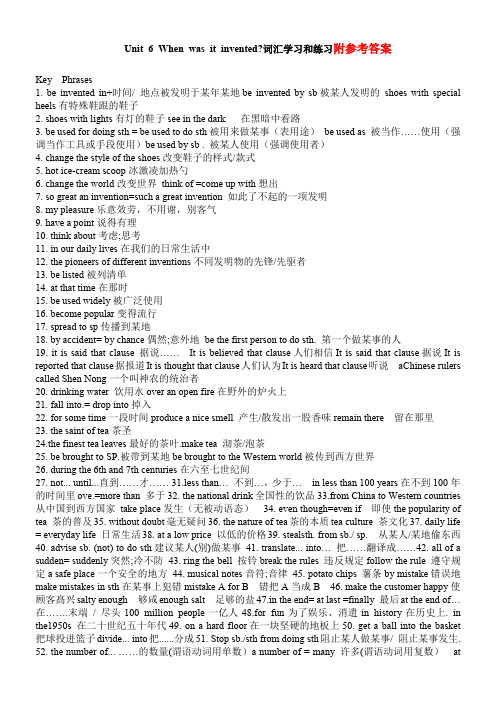
Unit 6 When was it invented?词汇学习和练习附参考答案Key Phrases1. be invented in+时间/ 地点被发明于某年某地be invented by sb被某人发明的shoes with special heels有特殊鞋跟的鞋子2. shoes with lights有灯的鞋子see in the dark 在黑暗中看路3. be used for doing sth = be used to do sth被用来做某事(表用途)be used as 被当作……使用(强调当作工具或手段使用)be used by sb . 被某人使用(强调使用者)4. change the style of the shoes改变鞋子的样式/款式5. hot ice-cream scoop冰激凌加热勺6. change the world改变世界think of =come up with想出7. so great an invention=such a great invention 如此了不起的一项发明8. my pleasure乐意效劳,不用谢,别客气9. have a point说得有理10. think about考虑;思考11. in our daily lives在我们的日常生活中12. the pioneers of different inventions不同发明物的先锋/先驱者13. be listed被列清单14. at that time在那时15. be used widely被广泛使用16. become popular变得流行17. spread to sp传播到某地18. by accident= by chance偶然;意外地be the first person to do sth. 第一个做某事的人19. it is said that clause 据说…… It is believed that clause人们相信It is said that clause据说It is reported that clause据报道It is thought that clause人们认为It is heard that clause听说aChinese rulers called Shen Nong一个叫神农的统治者20. drinking water 饮用水over an open fire在野外的炉火上21. fall into.= drop into掉入22. for some time一段时间produce a nice smell 产生/散发出一股香味remain there 留在那里23. the saint of tea茶圣24.the finest tea leaves最好的茶叶.make tea 沏茶/泡茶25. be brought to SP.被带到某地be brought to the Western world被传到西方世界26. during the 6th and 7th centuries在六至七世纪间27. not... until...直到……才…… 31.less than… 不到…,少于…in less than 100 years在不到100年的时间里ove.=more than 多于32. the national drink全国性的饮品33.from China to Western countries 从中国到西方国家take place发生(无被动语态)34. even though=even if 即使the popularity of tea 茶的普及35. without doubt毫无疑问36. the nature of tea茶的本质tea culture 茶文化37. daily life = everyday life 日常生活38. at a low price 以低的价格39. stealsth. from sb./ sp. 从某人/某地偷东西40. advise sb. (not) to do sth建议某人(别)做某事41. translate... into… 把……翻译成……42. all of a sudden= suddenly突然;冷不防43. ring the bell 按铃break the rules 违反规定follow the rule 遵守规定a safe place一个安全的地方44. musical notes音符;音律45. potato chips 薯条by mistake错误地make mistakes in sth在某事上犯错mistake A for B 错把A当成B 46. make the customer happy使顾客髙兴salty enough 够咸enough salt 足够的盐47.in the end= at last =finally 最后at the end of…在…….末端/ 尽头100 million people一亿人48.for fun为了娱乐、消遣in history在历史上. in the1950s 在二十世纪五十年代49. on a hard floor在一块坚硬的地板上50. get a ball into the basket 把球投进篮子divide... into把......分成51. Stop sb./sth from doing sth阻止某人做某事/ 阻止某事发生.52. the number of... ……的数量(谓语动词用单数)a number of = many 许多(谓语动词用复数)atthe same time 同时53. look up to钦佩;仰慕54.encourage sb. to do sth.鼓励某人做某事not only... but also... 不仅……而且…… e up with = think up 想出56.become an Olympic event成为一项奥运会项目the popularity of … …的流行,普及57.achieve one’s dreams 实现某人梦想58. dream of doing sth梦想干某事一选择题( ) 1.Mo Yan is famous _______ an excellent writer. And China is famous ______ culture.A. for; asB. as; forC. because; asD. as; for( ) 2. --When will A Bite of China II begin tonight?--It ________ for ten minutes.A. will beginB. has begunC. will be onD. has been on( ) 3. Sixteen-year-olds shouldn’t ______ to go to an Internet bar.A. be allowedB. be allowC. allowD. are allowed( ) 4. ---I’m not hungry but thirsty.---________A I’m hungry, too.B What about some cakes?C I’m happy to hear that.D How about a glass of water?( ) 5.— We can use QQ to talk with each other online.— Really? Could you please show me _______ it?A. what to doB. how to doC. when to doD. why to do( ) 6.As we know, _____of us likes pollution.A. no oneB. noneC. someoneD. nothing( ) 7.—Lily, _____ you _____ your ticket?—Not yet!A. did; findB. have; foundC. has; foundD. do; find( ) 8.When we went into the park, we were saw _____ Chinese Kungfu.A. playsB. played C .to play D. playing( ) 9.The invention was Wednesday afternoon.A. invented,inB. invented ,onC. inventing,of D, invent,for( ) 10. --------Remember this , children .________ you study,________ knowledge you will get.--------We know, Mr. Green.A. The harder, the lessB. The hard, the moreC. The harder, the moreD. harder, more( ) 11. Our teacher told us that the eartharound the sun.A. wentB. goC. goesD. would go( ) 12. Our classroom _____ every day, so it’s very clean.A. cleansB. is cleaningC. is cleanedD. cleaned( ) 13. Would you like to tell me _________next, Mr. Feng?A. what should we doB. we should do whatC. what we should doD. should we do what ( ) 14.——How is your grandma? ——She’s fine. She used to _____TV at home after supper. But now she is used to _____out for a walk.A. watch; goB. watching; goC. watching; goingD. watch; going( ) 15.Windows _________ glass,the paper ________ bamboo. A. be made of , be made ofB. are made of , is made ofC. are made of ,is made fromD. are made from., is made of( ) 16. — My dream is to build university on the moon some day.— It sounds likeunusual dream. I wish you could realize it.A. a; aB. an; aC. a; anD. an; an( ) 17. I didn’t think maths _______ important at that time.A. isB. wereC. areD. was( ) 18.nice glasses! Where did you buy them?A. HowB. What aC. WhatD. How( ) 19. Excuse me, would you please tell me ______buy a digital camera on line?A. what to B .how to C. what I can D. how can I( ) 20. Someone says, “Money is everything.” But I think time is _____ important than moneyA. muchB. lessC. much leastD. even more( ) 21 ____ Jack ____ Jim has been to to China, but ___ of them knows little about China in fact.A. Either; or; bothB. Neither; nor; bothC. Not only; but also; neitherD. Both;and; neither( ) 22.We don't know _________ he will come tomorrow._________ he comes,We 'll tell you.A.if;Whether B.whether;Whether C.if;That D.if;If()23.The knife is used ________ cutting.A.for B.as C.by D./()24.—I'm very________ with my own cooking. It looks nice and smells delicious.—Mm, it does have a ________ smell.A.pleasant; pleased B.pleased; pleased C.pleasant; pleasant D.pleased; pleasant ()25.The song came to my ears ________ accident.A.by B.with C.in D.for()26.The meeting ________ last Sunday night.A.happening B.happened C.took place D. takes place()27.Who were the zippers invented ________?A.by B.for C.with D.at()28.—Thanks for the delicious food. —________.A.No, thanks B.That's right C.All right D.My pleasure()29.The corn, potato and tomato are plants that were first ______ in America by Columbus.A.invented B.grown C.discovered D.found out()30.The car ________ by the policeman because the driver was drunk (喝醉的).A.stopped B.was stopped C.were stopped D.stops二完形填空Some years ago, Chinese high school students would show their school-bags, new clothes or new pens to their classmates when the new term started, Today, however, all have 1 .If you still come back to school 2 only these things, you are falling out-of-date(过时). Students in big cities like to bring the latest high-tech things to school, and feel happy and 3 to show off(炫耀) these things to_4_. Mobile phones, MP3 players, CD players, electronic dictionaries, the list is endless.Young people think that, living in the twenty-first century, they must keep up with the _5. They don’t want to fall 6_ . Besides, they think _7_ they need to keep in touch with their classmates, so they need mobile phones. They also like to _8_ the pop music, so they need CD players. They explain that, 9_ like electronic dictionaries, these can be _10 in their study, 11 . They think that their parents should understand 12_ they want these things.Foreign students will also bring some latest high-tech things when they 13to school at the beginning of a new term. _14_ , they often use the money which they made by themselves during the holiday to 15_ these high-tech things that they want.( ) 1. A. changed B. come C. joined D. stopped ( ) 2. A. to B. from C. of D. with( ) 3. A. right B. lucky C. nice D. pleased ( ) 4. A. other B. the other C. others D. he others( ) 5. A. times B. days C. years D. date ( ) 6. A. down B. off C. behind D. back( ) 7. A. that B. how C. if D. which ( ) 8. A. hear B. listen to C. read D. play( ) 9. A. look B. just C. feel D. something ( ) 10. A. new B. modern C. latest D. useful( ) 11. A. also B. too C. either D. then ( ) 12. A. where B. which C. what D. why( ) 13. A. return B. return back C. reach D. arrive ( ) 14. A. But B. However C.So D. Still( ) 15. A. borrow B. buy C. lend D. take三首字母填空。
九年级英语全册Unit6WhenwasitinventedTheThird
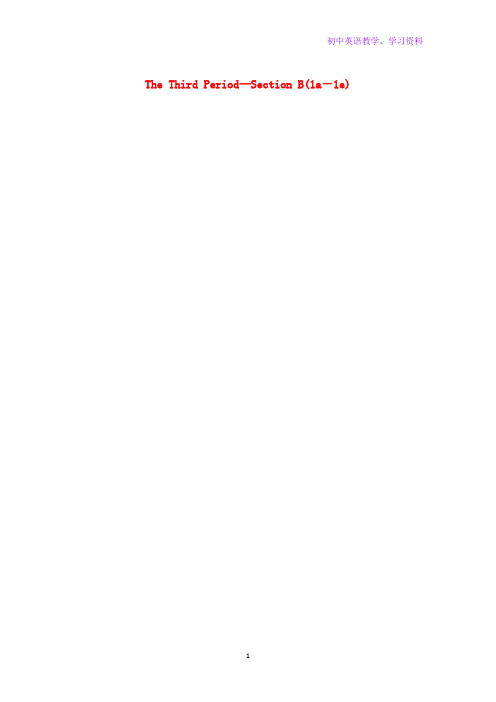
The Third Period—Section B(1a-1e)Teaching Important Points 『教学重点』Key words & phrases:sour,customerby mistake,in the endKey sentences:1.Potato chips were invented by mistake.2.Potato chips were invented by a cook called George Crum.Key structure:S+was/were+past participle+by…eg:Potato chips were invented by a cook called George Crum.Teaching Difficult Points 『教学难点』★Learn more participle verbs to say the passive voice.Teaching Aids 『教学工具』A tape recorder,CAI or multimedia courseware.Teaching Steps 『教学过程』★Step 1Leading in 『新课导入』1.GreetingGreet the class.2.BrainstormingQuickly ask questions about how tea was invented.3.Practice rewriting active sentences into passive voice.★Step 2Cooperative inquiry 『合作探究』1.Finish the task in 1a①Show pictures of potato chips,lemon,ice-cream,and salted duck eggs.Talk with the class about these foods and ask students to describe their taste.②Read and learn the new words.2.Finish the task in 1b①Do a brainstorming:T:What other fruit is sweet/sour?What food is crispy/salty?Help them to write the words in the list in 1b.②Ask different students to write their lists on the blackboard.③Ask some students:Do you like lemon?How about its taste?Is the apple sweet?…3.Finish the task in 1c①Look a t the sentences in 1c.Predict what we are going to hear.②Play the recording for the first time.Students listen and try to get the rough meaning.③Play the recording for the second time and students circle T or F.④Play the tape once again.Check their answ ers.4.Finish the task in 1d①Look at the passage in 1d.Play the recording for the fourth time.Get the students to fill in the blanks in 1d.②Read aloud the passage to see how they work.5.Finish the task in 1e★Step 3Homework1.Make conversations with other students talking about how potato chips were invented after class.2.Write a conversation to talk about something else.3.Translate the following sentences into English.(1)薯片是怎么发明出来的?________________________________________________________________________(2)那种食物甜脆可口。
九年级英语全Unit6Whenwasitinvented单元词句梳理SectionA(3a

必背句子
14. Did you know that tea, the most popular drink in the world(after water),was invented by accident? 你知道茶,世界上最受欢迎的饮料 ( 仅次于水) 是偶然被发明的吗?
15. It is said that a Chinese ruler called Shen Nong was the first to discover tea as a drink.
谢谢观赏
You made my day!
Unit 6 When was it invented?
单元词句梳理 Section A(3a-3c)
必背单词
1. ruler n.统治者;支配者→ __r_u_l_e_ v. 统治 2. boil v.煮沸;烧开→ _b__o_il_in_g__ adj. 正在沸腾的→ _b_o_i_le_d_
据说有一位叫神农的中国统治者最早发现了茶可以饮用。
必背句子
16. In England, tea didn’t appear until around 1660. 在英国,茶直到1660 年才出现。
不习惯读书进修的人,常会自满于现状,觉得再没有什么事情需要学习,于是他们不进则退。经验丰富的人读书用两只眼睛,一只眼睛看到纸面上的话,另 一眼睛看到纸的背面。2022年4月27日星期三2022/4/272022/4/272022/4/27 书籍是屹立在时间的汪洋大海中的灯塔。2022年4月2022/4/272022/4/272022/4/274/27/2022 正确的略读可使人用很少的时间接触大量的文献,并挑选出有意义的部分。2022/4/272022/4/27April 27, 2022 书籍是屹立在时间的汪洋大海中的灯塔。
九年级英语全册 Unit 6 When was it invented知识点总结 人教版
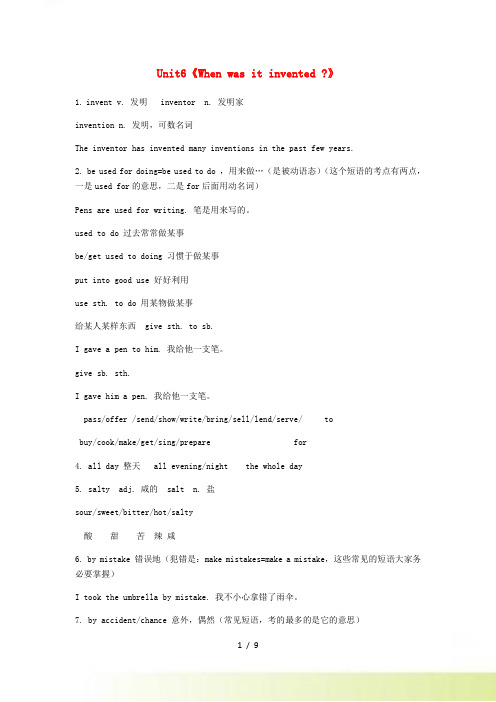
Unit6《When was it invented ?》1.invent v. 发明 inventor n. 发明家invention n. 发明,可数名词The inventor has invented many inventions in the past few years.2. be used for doing=be used to do ,用来做…(是被动语态)(这个短语的考点有两点,一是used for的意思,二是for后面用动名词)Pens are used for writing. 笔是用来写的。
used to do 过去常常做某事be/get used to doing 习惯于做某事put into good use 好好利用use sth. to do 用某物做某事给某人某样东西 give sth. to sb.I gave a pen to him. 我给他一支笔。
give sb. sth.I gave him a pen. 我给他一支笔。
pass/offer /send/show/write/bring/sell/lend/serve/ tobuy/cook/make/get/sing/prepare for4. all day 整天 all evening/night the whole day5. salty adj. 咸的 salt n. 盐sour/sweet/bitter/hot/salty酸甜苦辣咸6. by mistake 错误地(犯错是:make mistakes=make a mistake,这些常见的短语大家务必要掌握)I took the umbrella by mistake. 我不小心拿错了雨伞。
7. by accident/chance 意外,偶然(常见短语,考的最多的是它的意思)I met her by accident at bus stop.我在公共汽车站意外地见到了她。
